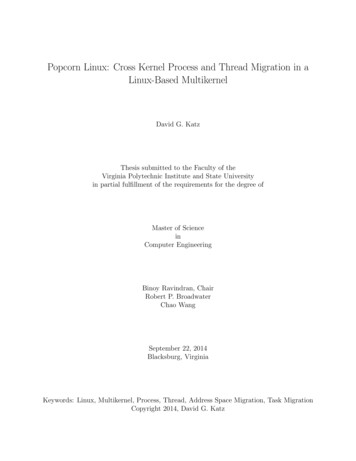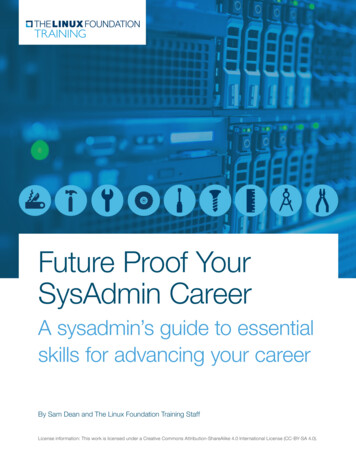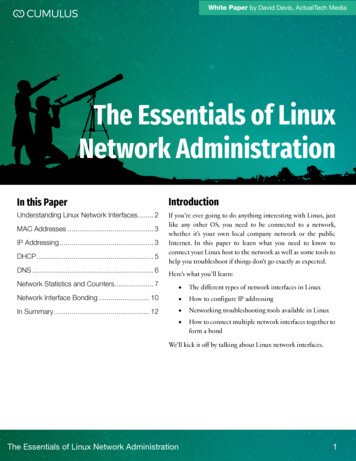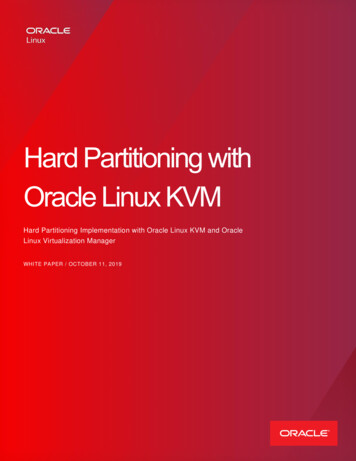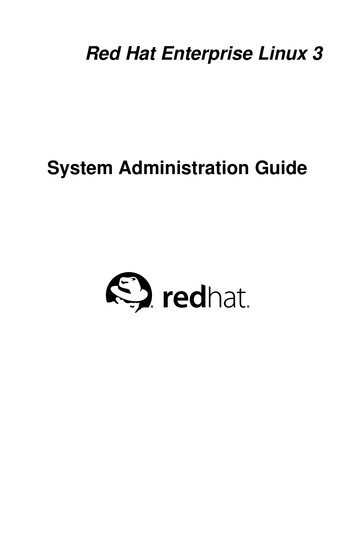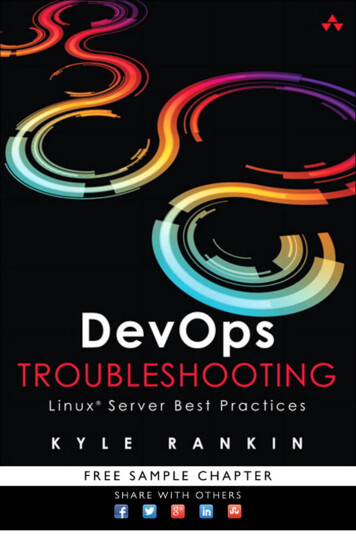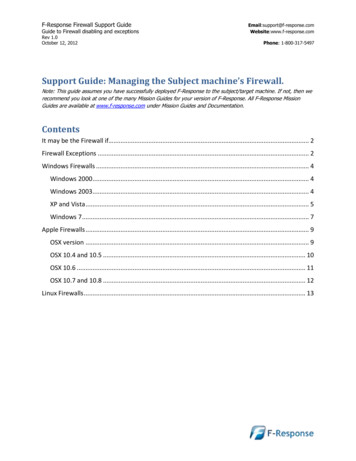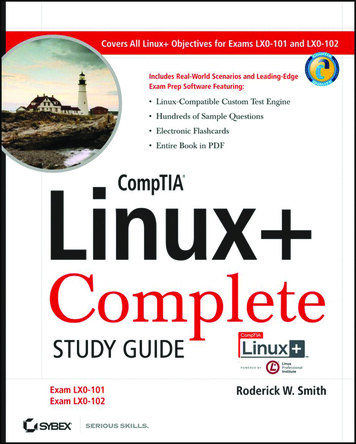
Transcription
LinuxCareer GuideSecond Edition
Table of ContentsIntroduction3Linux Careers4A Linux Success Story14Take Your Career to the Next Level16Become a Linux-Certified Professional17Linux Career Guide 2018Page 2
Welcome to the Exciting World of LinuxPhones, cars, even space ships. Just about everywhereyou look, you’ll find Linux enabling organizations todrive digital transformation and capitalize on newopportunities in the marketplace.Because it is found across technology platforms(mobile, social, networking, cloud computing, andBig Data), the jobs requiring Linux knowledge areabundant. According to the 2017 Open Source JobsReport, 65% of hiring managers are looking for Linuxprofessionals. Studies show that half of all hiringmanagers look specifically for Linux certifications,and certified employees are rewarded with higherpay increases and bonuses than their noncertifiedcolleagues.1“We need to have more people withLinux skills, because the writing ison the wall. Up to this point it wasoptional, but for people entering thefield today it’s not optional. It’s justpart of the base repertoire of skillsthat you need.”Nick Goldwater, Cisco EngineerBut certification isn’t the only route to a successfulLinux career. With Linux at the foundation of so muchtechnology, even a little Linux knowledge can makeyou more valuable to employers.Increasingly, businesses are favoring application-level and programming-level skills overtraditional networking skills. As one Cisco engineer recently told us, “We need to have morepeople with Linux skills, because the writing is on the wall. Up to this point it was optional,but for people entering the field today it’s not optional. It’s just part of the base repertoire ofskills that you need. You don’t have to be an expert. But you do need to be able to navigateand understand what you’re doing enough to do your job.” Not everyone is ready to makethis transition, but those who are will have a significant advantage over those who lackopen-source skills.Fortunately, it’s easier than ever to learn Linux. With NDG’s online courses, you don’t evenneed to know how to set up a Linux box. Our courses include a live Linux environment rightalongside course materials, so you can practice commands as you go along and learn bydoing. It’s the easiest and most effective way to learn Linux, and it’s free to get started.Whether you’re a newbie or a seasoned IT professional, learning Linux gives you a lifechanging skill upgrade that can help you build a rewarding career in a rapidly growing field.Explore this guide to learn about the many career paths and opportunities available forLinux-trained professionals.12017 Open Source Jobs Report, CompTIA HR Perceptions of IT Training and Certification Study.Linux Career Guide 2018Page 3
System AdministratorDo you like problem solving or have a knack fortroubleshooting complex issues? You may want to considera career as a System Administrator. With the everincreasing volume of Linux devices and servers, “sysadmins”are in high demand and command competitive wages.Linux System Administrators are responsible for the dayto-day maintenance and operation of Linux systems andsupport of their users. Employers typically look for abachelor’s degree in addition to certifications such as LinuxProfessional Institute’s LPIC-1: Certified Linux Administratorand CompTIA Linux . Prospective employees will alsobenefit from experience with virtualization, logging, usersupport, and hardware maintenance.SalarySystem AdministratorSalary Range: 52,000 to 99,00052K99KAverage US Salary: 71,144Worldwide Job 393,969All salaries are in USDSource: Payscale, Indeed.comLinux Career Guide 2018Page 4
SalarySystem EngineerSalary Range: 86,000 to 104,00086K104KAverage US Salary: 103,312Worldwide Job 8,05918,891All salaries are in USDSource: Payscale, Indeed.comSystem EngineerAre you a natural problem solver with aninterest in scripting, fixing major issues, anddesigning and deploying new systems? Thenyou may want to set your sights on a career asa Linux System Engineer. As more and morebusinesses adopt open-source technologies,demand for professionals who can design anddeploy these systems continues to grow.Linux Career Guide 2018Linux Systems Engineers frequently come up out ofthe ranks of System Administrators. They typicallyhave mid-level career experience in installing,configuring, testing and maintaining systems andinfrastructure, along with the ability to write customscripts to improve efficiency and automate commontasks. Employers typically look for a bachelor’sdegree, several years of related experience, expertknowledge of Linux, and administrative scriptingexperience (Perl, Python, shell, etc.).Page 5
System ArchitectAre you a visionary leader who enjoys working at theforefront of technology transformation? As a LinuxSystems Architect, you’ll work closely with multiplestakeholders across an organization to understand theirbusiness requirements—and then research, plan andarchitect the systems needed to meet their needs, nowand in the future.As business systems continue to grow in both size andcomplexity, so does demand for trained professionalswho are capable of addressing the architecturalchallenges they face. Because of the complexity ofthe role, a Linux Systems Architect typically is a seniorengineer with substantial knowledge of hardware,software and business systems. Employers typically lookfor at least a bachelor’s degree in information systemsor a related field, as well as mastery of the conceptsand theory behind high-performance computing, Linuxsystems administration, platform management, and otherrelated disciplines.Linux Career Guide 2018SalarySystem ArchitectSalary Range: 87,000 to 153,00087K153KAverage US Salary: 112,743Worldwide Job 73.906All salaries are in USDSource: Payscale, Indeed.comPage 6
SalarySupport TechnicianSalary Range: 35,000 to 68,00035KSupport TechnicianSupport Engineer68KAverage US Salary: 49,643Worldwide Job ,8281,404Support EngineerSalary Range: 51,000 to 105,00051K105KAverage US Salary: 2511,239All salaries are in USDSource: Payscale, Indeed.comEnjoy working directly with the public or with otherend users of technology? Support Techniciansand Engineers are responsible for the day-to-daysupport and assistance of IT products. This mayinclude support over the phone, in person, or viaemail. Support can be an important entry point intoother career openings, and you can gain valuableexperience from interacting with customers.Support roles require solid customer service skills,the ability to quickly diagnose issues, an aptitudefor creating clear documentation, and the abilityto work as part of a larger team. While supportjobs typically have lower requirements thanother positions, having Linux certifications andqualifications can help distinguish you from othercandidates and increase your compensation.Linux Career Guide 2018Page 7
SalarySoftware EngineerSalary Range: 75,000 to 150,00075K150KAverage US Salary: 109,087Worldwide Job 3,55312,959Software DeveloperSalary Range: 58,000 to 113,00058K113KAverage US Salary: 81,994Software EngineerSoftware 517,9654,172All salaries are in USDSource: Payscale, Indeed.comAre you looking for a stable career with growth potential? Software Engineers and Developers arehighly sought after and are in ever-increasing demand. Nearly every business and industry usessoftware for a core part of their operations, and this trend will only become more pronounced asnew technologies become available. Software Developers can either work as a contractor or as apermanent part of a larger team.Those looking for jobs in this sector typically require a bachelor’s degree in Computer Science orMathematics, skills in various computer languages, the ability to document, and familiarity withthe software development/release process. Prospective employees may also wish to have anunderstanding of the industry they desire to work in, as well as other relevant technical training.Foundational Linux skills can be an important first step in a successful career.Linux Career Guide 2018Page 8
Network AdministratorNetwork EngineerDo you take pride in your ability to manageevery detail to make complex systemsbulletproof? As the name implies, NetworkAdministrators and Engineers are responsiblefor the day-to-day administration ofcomputer networks. These positions areusually more narrowly focused than most ITjobs, but typically involve working as part ofa larger team.A large percentage of the network gear thatmakes the Internet and intranets work correctlyis running some form of Linux. Having theability to dig deeply into these systems andknowing your way around a command lineis crucial. Most Network Administrators andEngineers have multiple certifications such asthe LPIC-1: Certified Linux Administrator andCisco Certified Network Associate (CCNA).Knowing these core technologies is essential.SalaryNetwork AdministratorSalary Range: 50,000 to 112,00050K112KAverage US Salary: 69.011Worldwide Job 72,036Network EngineerSalary Range: 54,000 to 109,00054K109KAverage US Salary: 10,956All salaries are in USDSource: Payscale, Indeed.comLinux Career Guide 2018Page 9
SalaryIT ManagerSalary Range: 75,000 to 141,00075K141KAverage US Salary: 107,147Worldwide Job 93,93315,421IT TechnicianSalary Range: 27,000 to 54,00027K54KAverage US Salary: 36.924IT ManagerIT TechnicianAre you a person who works best in teamsand has exceptional organizational skills? Ifso, you may be a good fit as an IT Manageror IT Technician. IT Managers and Techniciansare responsible for maintaining and planningan organization’s technology infrastructure,as well as advising on and evaluatingprojects. Both jobs blend traditional businessmanagement skills with those of an ITprofessional to meet modern technologychallenges in today’s environment.Linux Career Guide 2018USAUKGermanyFranceMexico73,2389,1545,3356 2171,871All salaries are in USDSource: Payscale, Indeed.comOrganizations looking to hire forthese positions typically look for theiremployees to provide input on hiringfor other technical staff, the ability todelegate projects and responsibilities,meet goals, and have leadership skills.Certifications such as the Cisco CertifiedInternetwork Expert (CCIE) and CompTIAA can help set you apart from othercandidates when applying for thesepositions.Page 10
Cloud EngineerCloud DeveloperAre you a versatile jack-of-all-trades who enjoysworking on the cutting edge of technology? CloudEngineers and Developers are expected to havebackgrounds in a wide range of technologies and beable to adapt to one of the newest and most rapidlyevolving fields in the industry. Talented individuals withthese abilities are in high demand and will continue tobe so for some time.Cloud Engineers and Developers are responsible forthe various aspects of both migrating existing servicesover to the cloud and creating brand new technologiesusing the cloud. This could include managing teams andprojects, working as part of a large team, developingstandards, and even innovating entirely new ideas.Most importantly, these jobs require both knowledge ofexisting cloud tools and a willingness to quickly adaptto new tools as they become available. Since Linuxpowers a large percentage of both the servers and userdevices of this technology, a strong Linux foundationcould be essential to success.Linux Career Guide 2018SalaryCloud Engineer/DeveloperSalary Range: 51,000 to 133,00051K133KAverage US Salary: 86,842Worldwide Job 111,965All salaries are in USDSource: Payscale, Indeed.comPage 11
DevOps EngineerSalaryDevOps EngineerSalary Range: 93,000 to 136,00093K136KAverage US Salary: 113,256Worldwide Job 754,470All salaries are in USDSource: Payscale, Indeed.comLinux Career Guide 2018Do you excel in a fast-paced environment whereseconds matter? As anyone that deals with technologycan tell you, things invariably go wrong, and DevOps isusually on the front lines when it happens. Even whenthere isn’t some form of emergency, DevOps is aboutworking with products through their entire lifecycleand maintaining constant vigilance to spot issuesbefore they happen.While a DevOps Engineer is obviously going to havejob requirements specific to the product supported,most individuals in the field are cross-disciplinary andhave a large range of skills. Typical responsibilitiesinclude building, deploying, and administering softwarepackages in addition to monitoring their performanceand stability. Linux knowledge will set you apart,as many DevOps tools and their databases run onLinux and are integrated with tools throughout theenterprise.Page 12
Web DeveloperLooking for a position that allows youto manage a project from start to finish?Web Developers are responsible forbuilding and maintaining websites, as wellas managing their technical operation.This can involve taking a conceptthrough the design process all the way toa finished product, or working as part ofa larger team to finish a goal.Most positions require proficiency in webmarkup such as HTML and CSS, as well asexperience with servers hosting web content.Strong candidates for these positions usuallyhave a bachelor’s degree in computer scienceor a related field, and a solid understandingof various web technologies and practices.Since the majority of websites worldwideare hosted on servers running some form ofLinux, skills in this area can be quite valuableto a prospective employer.SalaryWeb DeveloperSalary Range: 56,000 to 112,00056K112KAverage US Salary: 87,661Worldwide Job 18,390All salaries are in USDSource: Payscale, Indeed.comLinux Career Guide 2018Page 13
A Linux Success StoryFrom World Languages Teacher to LPIC-1 Certification: The Road to Linux Mastery with Adam AndersonHave you ever thought about changing careers and breaking into the IT field? Or,maybe you’re already in IT and dream about leaving the helpdesk behind for amore challenging and rewarding career as a system administrator?Every year, millions of people do just that. But the big question is: How? Howdo you get potential employers to overlook the fact that you don’t have theright degree or experience to give you a job managing or troubleshooting criticalproduction systems?This is precisely the challenge Adam Anderson faced a few years ago. Afterspending several years traveling the world as an English and Drama teacher, Adamdecided teach himself Linux and begin a new career as an IT professional.“I had taught for nine years,” he recalls. “I had a really good run at it, with a lot ofgreat experiences, but I felt like I was hitting a ceiling both in my professional skillsdevelopment and also in terms of earning money. I didn’t feel like there was muchelse I could do that was new and different and a good challenge for me.”Then one day while listening to the Linux Action Show podcast, Adam heard thestory from a caller who had earned his Linux certification after nine months ofstudy and immediately got a job in IT. A light bulb went off for Adam: “I said, ‘Hey,that’s very doable and doesn’t require going back to university and spending awhole bunch more money.’ At that point, I made the commitment to myself tomake the transition.”So, Adam bought a couple of Linux textbooks, started taking online courses,and created an open-source blog (Kernel Mastery) to document his journey andfurther his learning. He quickly realized that certification would be important tosuccessfully making the career change.“There’s obviously a wide variety of certifications, so you have to do yourresearch,” Adam explains. “Some are more valuable than others and will give youa better return on your investment over time. I looked at a lot of the surveys andmarket data showing the compensation for the various IT certifications, and itlooked like Linux and LPIC-1 were among the best in that category, if not thebest. So I think these are great.”Linux Career Guide 2018Page 14
A Linux Success Story (cont.)From World Languages Teacher to LPIC-1 Certification: The Road to Linux Mastery with Adam AndersonAfter less than a year of studying Linux on his own, Adam got theLinux Essentials certification from CompTIA, followed by the Linux certification. One week later he got a job as a Support Technicianat Silicon Mechanics. A systems integrator and custom designmanufacturer, the company helps customers deploy open technologies,from building out HPC or storage clusters to the latest in virtualizationand containerized services.Today, Adam is a Senior Support Technician supporting everything fromlow-level hardware issues to firmware questions, remote/out-of-bandmanagement issues, networking, file systems, RAID, cluster management,and HPC. Adam is thankful for having an exciting and rewarding careeras a Linux professional: “I was able to get a job knowing Linux at a basicor intermediate level after studying it intensely for one year. Plus, it’slucrative, it’s fun and it’s always changing.”Linux Career Guide 2018Page 15
Take Your Career to the Next LevelStart learning Linux today with NDG’s self-paced, online coursesThere’s never been a better time to learn Linux. Everywhere you look—from Apple toZipcar—employers are looking for professionals with Linux skills to help them succeed inan open-source world. Jobs are plentiful. Salaries continue to outpace the market. And thecareers are highly rewarding, giving you the opportunity to make a real difference.Learning Linux gives you a powerful advantage in a competitive job market. Even basicLinux knowledge can help you climb to the top of the resume pile—or the career ladder. Andthe more you learn, the more valuable you become.NDG Online is the easiest and most effective way to learn Linux.A Linux virtual machine is embedded right alongside the course material. So you can learn ona real system, and start applying your newfound skills right away. Simply launch a module inyour web browser and start learning. It’s that easy.“There are a lot of Linux resources online, but NDG’s courses are by far the mostcomprehensive. They gave me the hands-on experience I needed to pass the Linux exam.”Franklin Pierre, Richland College StudentNDG Linux UnhatchedNDG Linux EssentialsLearn the basics for free!NDG eases you intoacquiring Linux knowledgewith a free online learningmodule that teachesbasic installation andconfiguration of Linuxsoftware and introducesthe Linux command line.This course teaches thefundamentals of the Linuxoperating system, command line,and open-source concepts. Withno previous knowledge required,this free online course gives youvaluable skills that will help youcompete for a broad range ofLinux-based jobs.NDG Linux I andNDG Linux IIThese courses enable youto develop foundationalLinux system administrationskills and prepare for theLinux Professional InstituteLPIC-1 or CompTIA Linux certifications, so that youcan obtain a rewarding Linuxtechnology career.Get started today at: netdevgroup.com/linux-careersLinux Career Guide 2018Page 16
Become a Linux-Certified ProfessionalMore money, more respect, and more job security. Research shows that you’ll earn a lot more than a bigger paycheckwith a Linux certification. You’ll enjoy a more rewarding career working at the forefront of technology. 92,46092%20%Avg Salary of LPIC-1 Certified LinuxAdministratorsEmployers Say IT-CertifiedEmployees Receive HigherStarting SalariesIncrease in Bonus Pay for LPIC-1Certified Linux AdministratorsGET THE CERTIFICATIONS THAT RECRUITERS ARE LOOKING FOROur Linux courses align to the following certifications.LPI Linux EssentialsThe Linux Essentials certification is a great way to show employers that you have the foundational skills needed to getyour next job or promotion. Getting certified demonstrates that you are familiar with the most popular open-sourceapplications, understand the major components of the Linux operating system, and possess the command-line skills toperform common tasks like managing files, performing backups and writing basic scripts. Linux Essentials is a valuablecredential for any IT professional. It’s also an ideal stepping stone to the more advanced LPIC-1 certification.Learn more: erviewLPIC-1 Linux AdministratorThe LPIC-1 is the world’s largest and most recognized Linux certification. An essential qualification for many systemadministrator jobs, the LPIC-1 validates that you have the command-line skills to customize the shell environment,write and run scripts, and manage databases and systems. You’ll also need to understand the architecture of Linuxsystems, how to perform routine maintenance tasks, and how to create network connections and secure Linuxsystems. By passing the LPIC-1 certification exam, you’ll gain entry into a special class of Linux professionals who enjoyboth high salaries and rewarding careers.Learn more: TIA Linux Powered by LPICompTIA partnered with LPI to create a powerful two-in-one Linux credential. The Linux certification uses the sametwo exams as the LPIC-1 certification. By passing the exams, you’re able to earn a Linux credential and then submita request that CompTIA share your results with LPI, so that you can receive a LPIC-1 certification as well. These twocertifications validate that you have foundational skills and knowledge in Linux system administration, which can giveyou a significant advantage on the job market.Learn more: n how NDG courses can help you get certified: www.netdevgroup.com/certificationCertification Magazine, CompTIA, Foote PartnersLinux Career Guide 2018Page 17
We develop training solutions that enable learners worldwide to develop IT skillsand prepare for rewarding careers. Our online learning platform makes hands-on,real-world IT training accessible to all, and enables people to contribute better totheir organizations, their families and their communities. We’re proud to work with anetwork of partners that includes the Cisco Networking Academy, Linux ProfessionalInstitute, and learning organizations around the world.netdevgroup.comLPI is the global certification standard and career support organization for opensource professionals. With more than 600,000 exams delivered, it’s the world’s firstand largest vendor-neutral Linux and open source certification body. LPI has certifiedprofessionals in over 180 countries, delivers exams in 9 languages, and has hundredsof training partners.Our purpose is to enable economic and creative opportunities for everybody bymaking open source knowledge and skills certification universally accessible.lpi.orgLinux Career Guide 2018Page 18
Linux System Administrators are responsible for the day-to-day maintenance and operation of Linux systems and support of their users. Employers typically look for a . Linux systems administration, platform management, and other related disciplines. System Architect.
